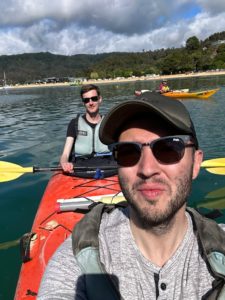
Well well well… long time no speak. I (Philip Pearson-Batt) have returned from my honeymoon – which is fast becoming a distant, but very happy, memory.

For those who have been living under a rock, my husband Paul and I recently spent 3 weeks exploring New Zealand and finished up with 24 hours in Singapore. We managed to pack a lot into our 3 weeks but here’s a summary of the highlights so that I don’t bore you all too much:
- The scenery, which no words can properly describe and which no photo will do justice to. Every time we said “the view cannot get better than this”, we turned the corner and the view just got better.
- Driving to a place called Milford Sound – we were supposed to fly there but it got cancelled. And thank goodness it did because the drive was incredible – at one point you reach a wall of waterfalls and thank goodness there was a long wait at the traffic lights because we just got to sit there and soak it all in (no pun intended).
- Seeing 357 (they count them) wild little blue penguins, including one who had wandered into town for the evening.
- Sampling the finest food and drink – like Tim Tams (a chocolate penguin but better) and Raspberry Coke Zero (why is this not a thing in the UK?) Oh, and I suppose also some delicious Michelin star ramen in Singapore and the finest wines that the Hawkes Bay region had to offer.


In summary, we had the best time and we highly recommend that if you are able get out to New Zealand (the 26 hours of flying wasn’t too bad actually) you absolutely, 100% must. If you want to know more, just mention a word beginning with the letter N and I’ll start talking about the trip.

But, as I say, my travels are now becoming a distant memory and it’s back to work properly for the last month of 2023 – where has the time gone?!
And as the year comes to an end, the Supreme Court have given us yet another early Christmas present! How generous are they?!
This time, the early present comes in the form of even more guidance on cases involving employment status, which has become ever more important as the gig economy continues to grow.
This time, rather than dealing with Uber drivers, the Supreme Court were asked to look at the employment status of Deliveroo riders.
In Independent Workers Union of Great Britain v Central Arbitration Committee, the Supreme Court upheld the Central Arbitration Committee’s decision that a group of Deliveroo riders were not workers and were, instead, genuinely self-employed.
I’m not going to go too much into what the claim was about other than to say, the union were seeking recognition for collective bargaining purposes for the group of riders. In normal people talk, they wanted to be recognised as the trade union for the riders so they could negotiate on their behalf. In finding that the riders were self-employed, the union won’t be granted recognition and won’t be able to negotiate on behalf of the riders.
What’s helpful for us in the world of employment and HR law is how the Supreme Court reached the conclusion that the riders were self-employed.
In deciding that the riders were self-employed, the Supreme Court placed a great deal of weight on the fact that the riders had a virtually unlimited right of substitution. Deliveroo didn’t police a rider’s decision to use a substitute, nor would they criticise or sanction the riders for doing so. They could send anybody they wanted to go and collect and deliver your local pizza.
Other relevant factors included the fact that:
- The agreement between Deliveroo and the riders allowed for a very flexible model of work:
- there was no obligation for Deliveroo to provide work;
- there was no obligation for the rider to be available at any time;
- there was no obligation for the rider to accept any jobs.
- Deliveroo did not object to riders working for competitors at the same time as they were working for Deliveroo.
Hopefully you can see that this decision reinforces the key tests when it comes to determining employment status which I’ve helpfully summarised below for you.
Is there mutuality of obligation? i.e. is the business required to provide work, is the individual required to accept it? If not, that’s indicative of self-employment rather than employment or worker status.
Is personal service required? i.e. can the individual provide a substitute or are they obliged to do the work personally? If there’s an unfettered right to provide a substitute, that will again indicate self-employed status.
Is there a high level of control over how, when and where the work is done? If there isn’t and the individual can come and go as they please and do the work as they see fit, that’s going to indicate self-employed status.
Far from being a niche point of employment law that us lawyer nerds love, this is actually a really important point of law, especially if you engage self-employed contractors. The risks in getting this wrong are massive – you could find yourselves exposed to claims you thought you were clear of (particularly around holiday pay and sick pay) and there could be tax implications as well. Getting it right is vital!
We’re expecting employment status and working patterns to remain near the top of the list for employment matters in 2024. It’s a controversial and not always clear-cut area of employment law and HR practice but it’s something that we at Precept are absolutely on top of. So, if you find yourself facing these sorts of issues or questioning employment status (which is a worthwhile question asking yourself to pre-empt any nasty surprises), please give us a call as we are ready, willing and able to help!


Recent Comments